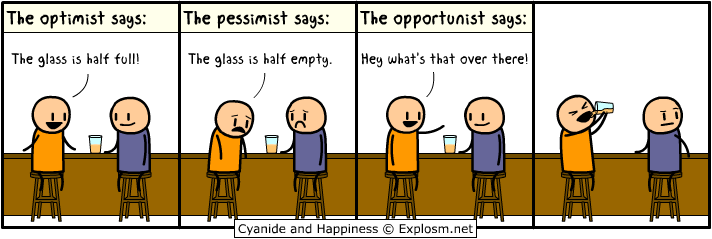A pessimist tends to see the worst aspect of things, to believe that the worst will happen, often accompanied by a lack of hope or confidence in the future. Sometimes I think watching the news is enough to make anyone pessimistic—and the more we watch, the more hopeless everything seems!
But then, again, everyone is different.
What’s So Bad About Pessimism? Let Us Count the Ways!
One article at BetterHelp discusses five ways pessimism can harm you—and here they are.
- A Pessimistic Attitude Can Hurt Relationships. Pessimists often have a hard time trusting other people. They assume the worst in others, sometimes making unfair accusations. They usually expect a relationship to fail, so planning a future together seems pointless.
- Pessimism Can Hurt Physical Health. The mind/body connection is well established in science. In the case of pessimists, their behaviors often don’t support good health. “For example, studies have found that pessimistic people are less likely to diet, exercise, or see a doctor when they need. They are also more likely to smoke.”
- A Pessimistic Mentality Can Hurt Your Career. Pessimistic people are more likely to give up when they encounter a difficult situation at work, are less likely to learn valuable lessons from their mistakes at work, and are more likely to create unwanted workforce drama.
- Pessimism Affects Self-Esteem And Confidence. It seems to me that the connection here is obvious and needs no elaboration.
- Pessimism Is Harmful To Mental Health. Although, technically, it isn’t a mental health disorder, pessimistic thoughts can closely mimic symptoms of some disorders. Pessimistic thoughts and emotions—such as anxiety, worry, anger, rage, or depression—cause the pessimist to suffer.
A study published in 2020 found that people who are strongly pessimistic about the future are at greater risk of dying earlier than those who are not pessimists, on average two years earlier—but contrary to previous studies, being an optimist didn’t extend life expectancy.
Another study found that the most pessimistic people are 21.8 percent less happy than realists.
Symptoms of a Pessimist
Although not a mental illness, pessimism (having a generally negative view of life and the world around them) is a personality trait—that is, it endures. The following list of ways to determine whether you are a pessimist comes from VeryWellMind. Clearly, you can also use these “symptoms” to identify pessimists around you.
- You feel surprised when things actually work out.
- You don’t go after what you want because you think you will probably fail.
- You tend to focus on what can go wrong in a situation.
- You think that the risks almost always outweigh the benefits.
- You experience imposter syndrome and undervalue your abilities.
- You tend to concentrate on your flaws or weaknesses rather than your strengths.
- You often feel annoyed by people who have an optimistic demeanor.
- You often engage in negative self-talk.
- You assume that all good things will eventually come to an end.
- You find it easier to live with the status quo than change things for the better.
And bad news for smart people: intelligent people tend to be more aware of situational complexities and so are more likely to worry and/or be pessimistic. As philosopher Antonio Gramsci said, “I’m a pessimist because of intelligence, but an optimist because of will.”



On the Other Hand: The Up Side of Pessimism
The pessimistic realization that not everything is moving in the right direction helps one rationalize the personal shortcomings we all have. Realizing that things outside one’s control could be the cause of problems is a comforting feeling, so people are attracted to it.
Pessimists are often better prepared for tough times and may avoid risks that more optimistic thinkers might take.
Research has shown that pessimists tend to foresee obstacles more readily because they expect things to go wrong, meaning that they are more likely to plan for difficulties.
Pessimism can actually be a positive thing when it helps identify — or even anticipate — problems at work.
Also, being pessimistic can be helpful in that one won’t feel shocked when challenges arise; rather, they will be expected and can be prepared for.
A pessimist is a good choice for a leader when making financial forecasts in a challenging season. Any leader who has led through tough times will tell you the first step to stop the bleeding is by taking a worst-case scenario approach to budgeting.
One sort-of-related study found that while most successful entrepreneurs will call themselves optimists, optimistic entrepreneurs earn 30% less than pessimistic ones on average.
Defensive pessimism is considered a coping technique used by individuals who set low expectations for situations regardless of prior success. These negative expectations are used to alleviate anxiety about situations by motivating them to plan ways to avoid the chances of poor outcomes. Essentially, defensive pessimists expect and plan for the worst case scenario as a means to avoid it. And it works.
Advantages of Defensive Pessimism
- Increased levels of self-esteem
- More satisfaction
- Better academic performance
- More support
- Better progress towards their goals
Optimism is considered by many to be the opposite of pessimism. And although there are some benefits to pessimism, I don’t recommend it as a life choice.
- Optimists experience less distress than pessimists when dealing with difficulties in their lives.
- Optimists suffer much less anxiety and depression.
- Optimists adapt better to negative events (including coronary artery bypass surgery, breast cancer, abortion, bone marrow transplantation and AIDS).
(Watch this space for an upcoming blog on optimism!)
Bottom Line: Be aware of pessimistic tendencies and assess their helpfulness in a given situation.





